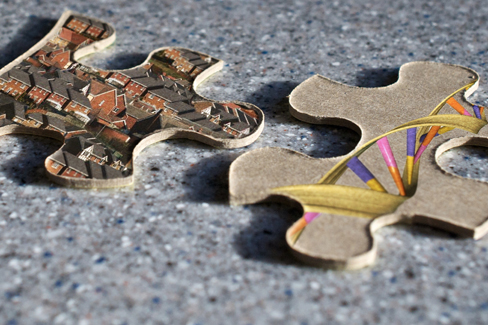| << Chapter < Page | Chapter >> Page > |
Another perspective on the interaction between genes and the environment is the concept of genetic environmental correlation . Stated simply, our genes influence our environment, and our environment influences the expression of our genes ( [link] ). Not only do our genes and environment interact, as in range of reaction, but they also influence one another bidirectionally. For example, the child of an NBA player would probably be exposed to basketball from an early age. Such exposure might allow the child to realize his or her full genetic, athletic potential. Thus, the parents’ genes, which the child shares, influence the child’s environment, and that environment, in turn, is well suited to support the child’s genetic potential.

In another approach to gene-environment interactions, the field of epigenetics looks beyond the genotype itself and studies how the same genotype can be expressed in different ways. In other words, researchers study how the same genotype can lead to very different phenotypes. As mentioned earlier, gene expression is often influenced by environmental context in ways that are not entirely obvious. For instance, identical twins share the same genetic information ( identical twins develop from a single fertilized egg that split, so the genetic material is exactly the same in each; in contrast, fraternal twins develop from two different eggs fertilized by different sperm, so the genetic material varies as with non-twin siblings). But even with identical genes, there remains an incredible amount of variability in how gene expression can unfold over the course of each twin’s life. Sometimes, one twin will develop a disease and the other will not. In one example, Tiffany, an identical twin, died from cancer at age 7, but her twin, now 19 years old, has never had cancer. Although these individuals share an identical genotype, their phenotypes differ as a result of how that genetic information is expressed over time. The epigenetic perspective is very different from range of reaction, because here the genotype is not fixed and limited.
Visit this site for an engaging video primer on the epigenetics of twin studies.
Genes affect more than our physical characteristics. Indeed, scientists have found genetic linkages to a number of behavioral characteristics, ranging from basic personality traits to sexual orientation to spirituality (for examples, see Mustanski et al., 2005; Comings, Gonzales, Saucier, Johnson,&MacMurray, 2000). Genes are also associated with temperament and a number of psychological disorders, such as depression and schizophrenia. So while it is true that genes provide the biological blueprints for our cells, tissues, organs, and body, they also have significant impact on our experiences and our behaviors.
Let’s look at the following findings regarding schizophrenia in light of our three views of gene-environment interactions. Which view do you think best explains this evidence?
In a study of people who were given up for adoption, adoptees whose biological mothers had schizophrenia and who had been raised in a disturbed family environment were much more likely to develop schizophrenia or another psychotic disorder than were any of the other groups in the study:
The study shows that adoptees with high genetic risk were especially likely to develop schizophrenia only if they were raised in disturbed home environments. This research lends credibility to the notion that both genetic vulnerability and environmental stress are necessary for schizophrenia to develop, and that genes alone do not tell the full tale.
Genes are sequences of DNA that code for a particular trait. Different versions of a gene are called alleles—sometimes alleles can be classified as dominant or recessive. A dominant allele always results in the dominant phenotype. In order to exhibit a recessive phenotype, an individual must be homozygous for the recessive allele. Genes affect both physical and psychological characteristics. Ultimately, how and when a gene is expressed, and what the outcome will be—in terms of both physical and psychological characteristics—is a function of the interaction between our genes and our environments.
You share half of your genetic makeup with each of your parents, but you are no doubt very different from both of them. Spend a few minutes jotting down the similarities and differences between you and your parents. How do you think your unique environment and experiences have contributed to some of the differences you see?

Notification Switch
Would you like to follow the 'Psychology' conversation and receive update notifications?